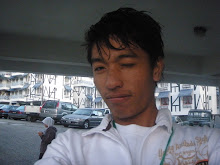
Haji Abdul Malik Karim Abdullah or Hamka was born on February 17, 1908 in Molek village, Maninjau, West Sumatera, Indonesia. He was Indonesian Ulama, political activist and man of letters.
His father, Syeikh Abdul Karim bin Amrullah or Haji Rasul was a founder of the reformist movement in Minangkabau, West Sumatera, Indonesia, in 1906 C.E, after his back from Mecca. Among the Minangkabau society, Hamka was called Buya. The word "Buya" derives from Arabic abi or abuya that means my father. In the Minangkabau society, the title "Buya" is only inaugurated to that person who is considered as an honorable man.
In his early formal education, Hamka just reached the second level of elementary school in Maninjau. But in the tenth of his age, he began to deepen Islamic knowledge and Arabic language in Sumatera Thawalib, the Islamic high school established by his father in Padangpanjang. Additionally, he learned the Islamic knowledge in many suraus (small mosque) and mosques supervised by the prominent Ulamas such as Syeikh Ibrahim Musa, Syeikh Ahmad Rasyid Sutan Mansur, R.M. Surjopranoto, and Ki Bagus Hadikusumo. His endeavor to master both Islamic and secular knowledge, pushed him to deepen philosophy, literature, history, sociology and politics by autodidact. He read many outstanding Arabian intellectuals works such as the works of Zaki Mubarak, George Zaidan, Abbas al-Aqqad, Mustafa al-Manfaluti and Hussain Haikal, that inspired him to be more progressive in thought.
Furthermore, by mastering an Arabic language very well, he was capable of reading and criticizing the works of western thinkers that had been translated into Arabic, such as the works of Albert Camus, William James, Sigmund Freud, Arnold J. Toynbee, Jean Paul Sartre, Karl Marx and Pierre Loti. In the meantime he met and discussed, for many times, with those prominent Muslim intellectuals who settled in Jakarta, such as HOS Tjokroaminoto, Raden Mas Surjopranoto, Haji Fachruddin, Ahmad Rasyid Sutan Mansur and Ki Bagus Hadikusumo.
At the beginning of his carrier, Hamka taught an Islamic knowledge at Perkebunan Tebing Tinggi, Medan, South Sumatera in 1927, and at Padang Panjang in 1929. His high dedication in Islamic education brought him in 1951 to be installed as Pegawai Tinggi Agama (high state official of religion) by the Indonesian Minister of Religion. From 1957 to 1959 he was a lecturer at the Jakarta Islamic University and the University of Muhammadiyah in Padang panjang. In the same year, he was entrusted to be a rector of Islamic Institute in Jakarta.
Hamka not only involved himself extensively in an Islamic education, but also in social organization movements. In 1925, in Padangpanjang, he was one of the founders of Muhammadiya (one of the big Indonesian Muslim organizations) that primarily focuses on denouncing khurafat (religious fable), bid'ah (innovation in religious rituals) and the astray mystical associations. Playing a central role in both Muhammadiya and government, he occupied several important positions: as a head of branch of Muhammadiya in Padangpanjang (1928); as a founder of Pusat Latihan Pendakwah Muhammadiya (Center for Muslim Preacher Training of Muhammadiya) in 1929; as a consul of Muhammadiya in Macasar (1931); as a head of Majelis Pimpinan Muhammadiya (guidance council of Muhammadiya) in West Sumatera (1953); as Penasehat Pimpinan Pusat Muhammadiya (the Adviser of the Central Guidance of Muhammadiya) in 1953; as a Minister of Religion (1977); and as a head of Majlis Ulama Indonesia (Indonesian Ulama Council) in 1981.
Hamka began to engage in political activity in 1925 as a member of one of Islamic political parties, namely Sarekat Islam. He condemned strongly the Dutch colonialist that backed to Indonesia in 1945 through his political speech and guerilla movement in Medan. In 1947 he was a head of Barisan Pertahanan Nasional Indonesia (Indonesian National Defense Troop). He was also a member of constituent from Masyumi (the big Indonesian Muslim political party in the 1950-1960s); he served as an expert of campaign of general election in 1955. In the mid 1960s, he was installed as a member of Badan Musyawarah Kebajikan Nasional Indonesia (Convention Unit of Indonesian National Virtue); as a member of Majelis Perjalanan Haji Indonesia (Council of Indonesian Pilgrimage); and as a member of Lembaga Kebudayaan Nasional Indonesia (the Institution of Indonesian National Culture).
Although he spent most of his life in educational, political, social and religious activities, he was also acknowledged as the most prolific of Indonesian writers. In the 1920s, he was a journalist of many printed media: Pelita Andalas, Seruan Islam, Bintang Islam and Seruan Muhammadiya. In 1932, he published a journal in Macasar, namely al-Mahdi. During his life, he worked as an editor in many magazines such as Kemajuan Masyarakat, Pedoman Masyarakat, Panji Masyarakat and Gema Islam. He was also a chief of editor for many magazines: Pedoman Masyarakat (1936-1942), Panji Masyarakat (1956) and Mimbar Agama, a magazine owned by the Department of Religion from 1950 to 1953.

Hamka wrote so many books on Islamic knowledge and novels. His masterpiece book is his thirty volumes Tafsir al-Azhar. Meanwhile, his great novels that got large attention from the Malay people in Indonesia, Malaysia and Singapore are Tenggelamnya Kapal Van Der Wijck, Di Bawah Lindungan Kaabah and Merantau ke Deli. He passed away on July 24, 1981 in Jakarta when he was 73 years old.
Reference:
.http://en.wikipedia.org/wiki/Hamka
Reference:
http://melayuonline.com/fr/personage/dig/284/abdul-malik-karim-amrullah-h
Reference:
.http://en.wikipedia.org/wiki/Hamka
Reference:
http://melayuonline.com/fr/personage/dig/284/abdul-malik-karim-amrullah-h



No comments:
Post a Comment